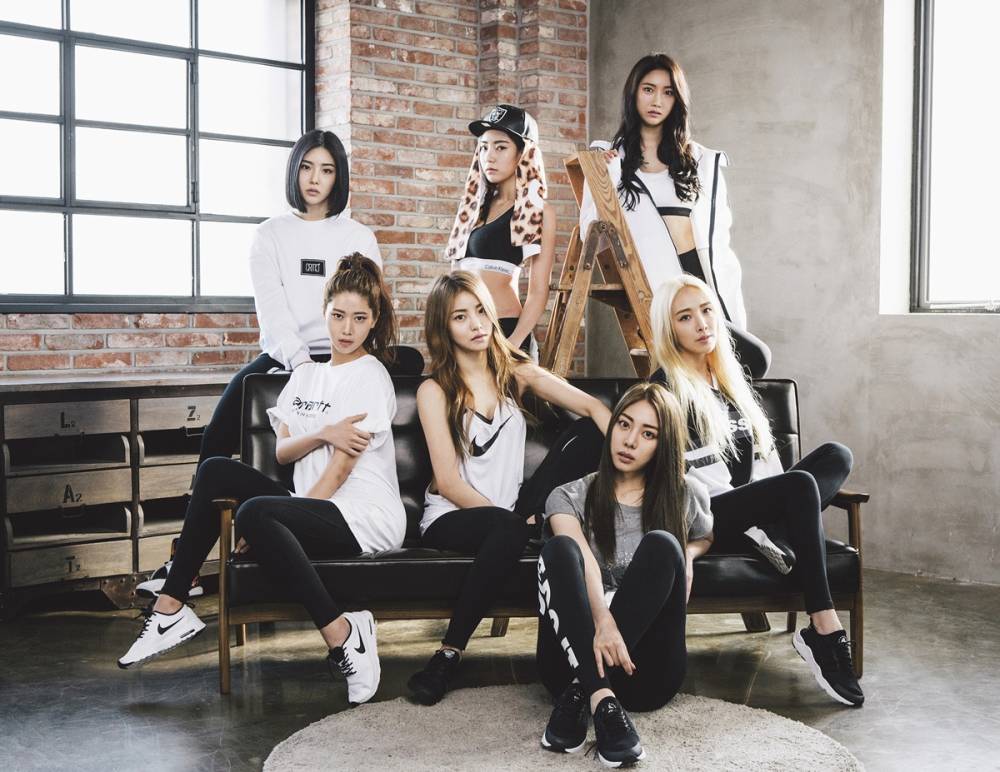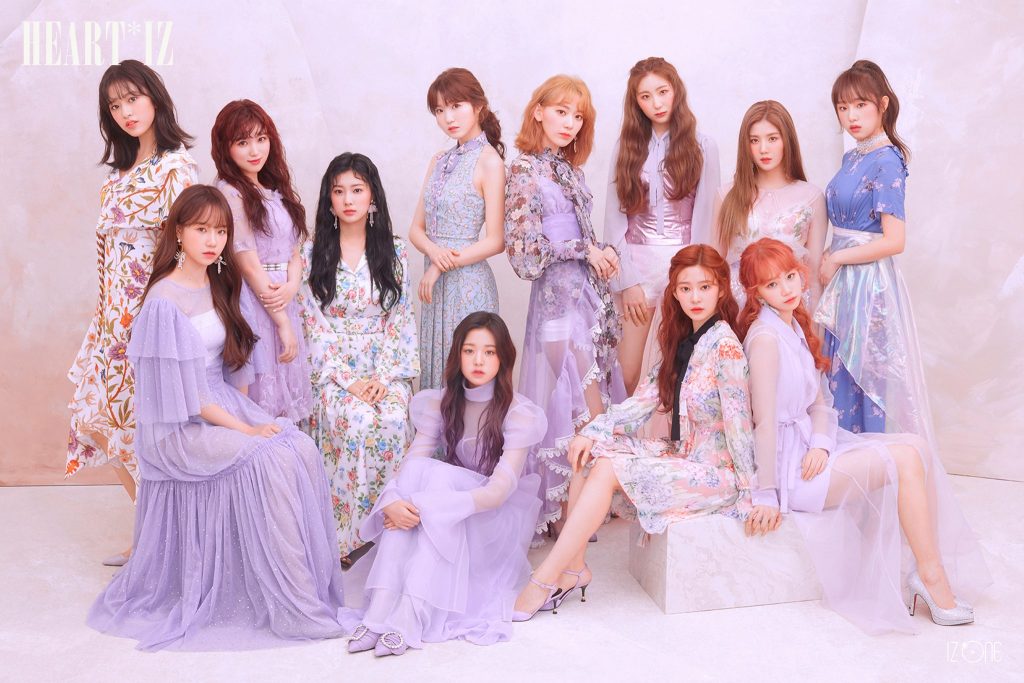
Brave Girls’ “Rollin” is a very good song. It has a driving beat, a wildly catchy hooky, and a distinctly summery flair. Before late February 2021 though, neither “Rollin” nor its girl group were well known. “Rollin” was one of those songs that a few tenacious K-pop fans might have hidden on their playlists, ready to jump to the front of any discussion about underrated bops. Brave Girls were a nearly 10-year old group with little to show for their years of work except disappointment. They were on the verge of disbandment.
Then, out of nowhere, Brave Girls went viral. Specifically, a compilation of the group singing their 2017 release “Rollin” at military concerts blew up, garnering millions of views. Before anyone could blink, “Rollin” was flying its way to the top of Korean music charts, eventually achieving a coveted perfect all-kill (IU is the only other artist to accomplish this in 2021 so far). After the song’s resurgence, Brave Girls came back to music shows to perform “Rollin” and quickly racked up a generous handful of music show wins. They have also gained substantial popularity among the Korean public.
Almost overnight, a 4-year old song has catapulted Brave Girls out of obscurity and into the limelight. It’s a rare K-pop underdog success story and has drawn comparisons to some other famous viral moments in the industry, especially EXID’s rise to fame via fan cam. As lovely as it would be to bask in the glory of this unexpected victory, Brave Girls have quite the task ahead of them in the packed and rapidly moving K-pop sphere. Can they turn the meteoric rise of “Rollin” into a long-term career boost? Or will “Rollin” only grant Brave Girls a brief moment in the spotlight?
K-pop history provides many reasons to be pessimistic. While EXID did parlay their viral sensation into a successful years-long career, there are also instances like Crayon Pop where a hit song proved to be not nearly enough to permanently boost its group. K-pop is also absolutely brimming with acts, each one constantly poised to tempt the spotlight away from the previous day’s sensation. The industry moves incredibly fast, so if a group isn’t canny and quick about seizing opportunity, that chance can leave just as speedily as it came.
All that being said, Brave Girls are arguably in a pretty good position to capitalize on the popularity of “Rollin”. That is because the same factors which catapulted “Rollin” to the top of the charts are also elements that can continue to serve Brave Girls well in their search for long-lasting and sustainable fame.
A brief glance at Brave Girls’ career trajectory might lead you to label them as a pretty average struggling K-pop girl group. Their history is littered with comebacks that failed to make a commercial splash, member changes, and long hiatuses. In reality, it would be more accurate to call Brave Girls a group that should have succeeded, but due to ill luck and poor timing, wasn’t able to build off their solid foundations until “Rollin” went viral.

Brave Girls are managed by Brave Entertainment, a company founded by famous K-pop producer Brave Brothers. Contrary to his plural name, Brave Brothers is one person, and he is best known for creating almost all of AOA’s major hits. You can certainly criticize Brave Brothers for his management skills. Based on Brave Girls’ early career, those abilities are non-existent. But there is no denying, the man can write a good song. That’s exactly what he did with “Rollin”, a born hit track, even if it took four years post-release to get there. For that matter, much of Brave Girls’ discography is filled with undiscovered Brave Brothers’ penned treasures, like the sultry “Deepened” and the refreshing “We Ride”.
Brave Brothers is reportedly already hard at work writing Brave Girls comeback, and that’s a big win for them. If he can pen anything even half as relentlessly catchy as “Rollin”, and in a timely fashion, Brave Girls could have another smash success on their hands.
Another factor in the popularity of “Rollin” that could continue to serve Brave Girls well is the perceived wholesomeness of its story, and by extension the group’s story as well. The video that went viral was of Brave Girls performing “Rollin” numerous times in front of hilariously enthusiastic military crowds. It’s a straight-forwardly fun video, but the story behind it is genuinely compelling, and no doubt contributed to the resurgence of “Rollin”.
Brave Girls have performed more than 100 times at South Korean military concerts. That’s a staggering figure, made even more meaningful by the fact that such concerts are usually held in remote locations and come with minimal compensation for performers. Despite this, Brave Girls are clearly committed to their stages in the viral video, adding a layer of poignancy to their performances. Current members Eunji, Minyoung, Yuna, and particularly the effervescently smiley Yujeong sparkle in the military performances, full of fun and joyful energy.
Brave Girls constant presence at military events apparently made “Rollin” a very popular song among the enlisted, as can be seen by the hyped audiences and internet comments from soldiers showcased in the viral video. Being loved by the military is no small thing, as every South Korean man serves at some point. It’s a shared and formative experience in South Korean society, and the military as a whole tends to be glamorized by South Korean media as something that represents the pinnacle of bravery and honor.
Of course, the military is not all sunshine and roses; it sits at the heart of geopolitical tension in South Korea and the institution itself has streaks of despotism in its very DNA (military service is compulsory in South Korea, with limited allowances for conscientious objection). By courting military favor, Brave Girls have taken a path that many other girl groups have used before to reach a broad audience outside of the usual K-pop listeners and to garner compliments from some South Korean citizens for their perceived patriotic service as military performers.

The military can also be a powerful source of backing in K-pop, mostly through official campaigns done in conjunction with girl groups. It remains to be seen if this opportunity will be afforded to Brave Girls, to a military PR machine that emphasizes a distinctly purity-focused brand of nationalism. Regardless of the military’s will, the nature of Brave Girls’ viral video will likely mean that their popularity will long be associated specifically with the military, for better or worse.
Military connection aside, the impression that the whole group gives off in the viral video, and have maintained through their meteoric rise, is of a bunch of hard-working and sweet-natured idols. That seems to have struck a good chord with the South Korean public and K-pop fandom at large. This public image could definitely continue to help Brave Girls in their search for longterm career success.
The final factor that contributed to the resurgence of “Rollin”, and that could keep aiding Brave Girls going forward, is timing. Making it in the entertainment business surely takes talent and hard work, but it also takes luck. Timing is everything.

When the video that would relaunch Brave Girls was released at the end of February 2021, K-pop was experiencing a power vacuum, something that the industry continues to suffer from. Certainly, BTS is still flying high, but many other high-profile groups are not currently active. Enlistments have put groups like Exo and Winner on temporary hiatus, and recent or looming contract expirations have affected Got7 and Iz One’s activities, as well as potentially Mamamoo and Red Velvet (both girl groups are rumored to have contracts expiring in 2021 and have been notably inactive as of late).
Scandals have also sidelined some groups, especially the recent rash of bullying scandals that hit many third-generation and fourth-generation power players especially hard. Non-bullying-related scandals have impacted K-pop stalwarts like TVXQ. And while some second-generation groups are finally making comebacks post-enlistment (Shinee comes to mind), 2PM’s return, while imminent, has not happened yet, and Bigbang‘s long-rumored comeback is still nowhere in sight.
When speaking about second-generation idols, it is worth noting that few second-generation girl groups are still together and promoting at all. Overall in the girl group arena specifically, there’s a bit more wiggle room for an unexpected new star than usual. Twice still reigns as the nation’s current girl group, but they have recently decreased the frequency of their comebacks. Other girl groups like Red Velvet, Blackpink, GFriend, and Apink, alongside rising stars Itzy, (G)I-dle, Aespa, Everglow, and Loona all enjoy popularity. But none of them are dominant, and that creates an opening for a group like Brave Girls to sweep in to the girl group power circle.

All of these circumstances meant that when “Rollin” began to receive public attention, there was perhaps more public attention than usually available. The previously described compelling nature of Brave Girls’ underdog story also made them uniquely appealing during a time when K-pop was, yet again, engulfed in a wave of scandals and netizen uproar. Because “Rollin” is a fantastic song, Brave Girls were able to fully capitalize on the good timing of their renaissance. But timing was definitely a factor.
In some ways, the power vacuum continues in K-pop, although to a slightly smaller extent. In particular, many of the groups impacted by the bullying scandals have more or less bounced back and are likely to be active again soon. Still, this feels like a time where an underdog act, especially one as likable as Brave Girls, have an actual chance to make an impact in an industry that is often impossible to navigate for groups that don’t have large-company and established-fandom backing.

A lot rides on Brave Girls upcoming follow-up comeback to “Rollin”. But if Brave Girls can again harness the three factors that made “Rollin” a 2021 surprise hit, they really might have a shot at long-term career success.
Of course, it’s easier said than done to dazzle with excellent songwriting and production, maintain a feel-good group narrative and image, and capitalize on good industry timing. But Brave Girls have already beat the odds once. Why not again? If they can succeed, then they will become something even rarer in K-pop than a viral sensation. Brave Girls will become a proper K-pop fairy tale, happy ending and all.
(ABC, The Diplomat, Naver, South China Morning Post, Twitter, YouTube[1][2]. Images via Brave Entertainment, Off the Record Entertainment)

